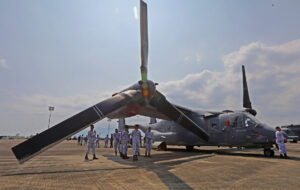
Philippines, US, Japan and Australia likely to collectively act versus China
By Kyle Aristophere T. Atienza, Reporter
THE PHILIPPINES, United States, Japan and Australia are expected to come up with a collective military and cybersecurity action to deal with China’s growing assertiveness in the South China Sea, political analysts said at the weekend.
The four-way partnership shows the US has veered away from its usual bilateral deals with Asian allies, said Joshua Bernard B. Espeña, who teaches international relations at the Polytechnic University of the Philippines.
“Historically, Washington’s Asian alliances have been bilateral compared with the North Atlantic Treaty Alliance, which is collective defense,” he said in a Facebook Messenger chat.
The four countries on Sunday held joint military drills within the Philippines’ exclusive economic zone in the disputed waterway.
The Maritime Cooperative Activity, the same name for Philippines-US joint drills in the sea that began in November, demonstrates their commitment “to regional and international cooperation in support of a free and open Indo-Pacific,” their Defense ministers said in a joint statement on Saturday.
The activity aims to “strengthen the interoperability of our defense/armed forces doctrines, tactics, techniques and procedures.”
The four nations said their naval and air force units seek to demonstrate “professional interactions.”
Five vessels were expected to be deployed for the activity — two from the Philippines, and one each from the US, Japan and Australia, according to Philippine military spokesman Arsenio R. Andolong.
The four nations also reiterated that the 2016 arbitral ruling that voided China’s expansive claims in the South China Sea is final and binding.
Mr. Espeña said the Philippines, Japan and Australia, though long-time partners in trade and people-to-people relations, are “keeping up in bolstering interoperability of systems and capabilities” in support of a rule-based order under US leadership.
“Exercises are important to make that happen,” he said. “Each of the allied forces is required to show their capabilities in orchestrating coalition-based operations against a common foe (China).”
“In this case, familiarizing themselves with the operational environment contributes to the deterrence needed by diplomats to leverage a peaceful order.”
Chinese President Xi Jinping last month called on his country’s armed forces to coordinate preparations for military conflicts at sea and help develop China’s maritime economy.
The International Monetary Fund expects China’s economic growth to slow to 4.6% this year from an estimated 5.4% last year.
“Regular military exercises and formalized defense agreements will enable the new quadrilateral grouping,” Chester B. Cabalza, founder of Manila-based International Development and Security Cooperation, said in a Facebook Messenger chat.
“It is likely for all four democracies to continue integrating their defense activities in the long run particularly in the maritime domain given how it is a vital interest of all four countries to keep the South China Sea free, open and rules-based,” Don Mclain GIll, who teaches international relations at De La Salle University in Manila, said via Messenger chat.
The Sunday war games were held amid worsening tensions between the Philippines and China, which claims the South China Sea almost in its entirety.
The Philippine Coast Guard (PCG) on Saturday said the Chinese Coast Guard had harassed Philippine vessels at Iroquois Reef, which is at the southernmost part of oil-and-gas rich Reed Bank and is about 237 kilometers northwest of Palawan province.
PCG spokesman Jay Tristan Tarriela in an X post on Saturday said ships of the PCG and the Philippine fishery bureau, which were accompanied by two fishing boats, were dropping “floating aggregate devices” in the area on April 4 when the Chinese vessels “went as far as pretending to man their water cannons and threatening the Filipino fishermen.”
China demonstrated “unlawful behavior aimed at depriving the Filipinos of their rights to access the resources in our exclusive economic zone,” Mr. Tarriela said.
“The so-called Maritime Cooperative Activity does nothing to ease the tense situation in the West Philippine Sea in light of what’s going to happen in the next few weeks — the trilateral summit in the US, the biggest Balikatan (shoulder-to-shoulder) military exercises and continued building of US military facilities in the Philippines,” Bagong Alyansang Makabayan Secretary-General Raymond Palatino said in a Messenger chat.
American Army engineers arrived in the northernmost Philippine province of Batanes last week for the construction of military infrastructure including a humanitarian logistics warehouse as part of the annual war games between the Philippine and US militaries.
“The military transformation of such an idyllic island is highly deplorable and would further escalate the growing tensions in the South China Sea,” Party-list Rep. France L. Castro said in a statement. “It would also make Batanes a target of attacks as it would be a forward base of the US if China moves against Taiwan.”
The Maritime Cooperative Activity will precede a summit among Philippine President Ferdinand R. Marcos, Jr., US President Joseph R. Biden and Japanese Prime Minister Fumio Kishida in Washington on April 11.
They are expected to advance a trilateral partnership built on historical ties, growing economic relations, shared democratic values and a “shared vision for a free and open Indo-Pacific.”
The three leaders will also discuss how to advance their economic and climate cooperation, according to the White House.
Washington is expected to “reaffirm ironclad alliances” with Manila and Tokyo, which are both American treaty allies.



